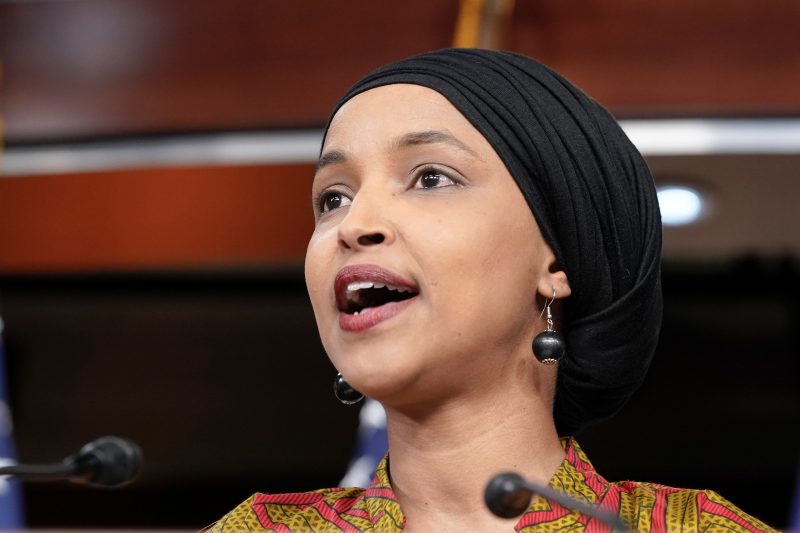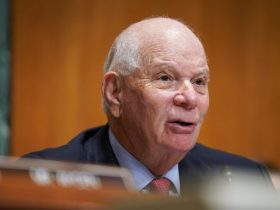Rep. Ilhan Omar (D-Minn.) faces a rematch Tuesday against a primary opponent who almost defeated her two years ago but has not drawn the big-money backing that helped topple two other members of the liberal “Squad” this year.
Don Samuels, a former member of the Minneapolis City Council, is among three Democrats challenging Omar for her solidly blue district based in Minneapolis. He gave her a close call in 2022, coming within 2,500 votes of unseating her.
The race is one of the most high-profile contests among primaries across four states on Tuesday: Connecticut, Minnesota, Vermont and Wisconsin. In Wisconsin, voters are expected to make official a closely watched Senate matchup between Sen. Tammy Baldwin (D) and GOP businessman Eric Hovde.
In Minnesota’s 5th District, Omar has sought to avoid another close race while managing to evade serious opposition from pro-Israel groups — namely, the American Israel Public Affairs Committee — that spent millions to unseat Reps. Cori Bush (D-Mo.) and Jamaal Bowman (D-N.Y.) in the two most expensive House primaries this year. AIPAC’s super PAC arm, the United Democracy Project, has not explained its apparent absence from the primary, though Samuels has called it a missed opportunity for national organizations.
Like Bush and Bowman, Omar has been an outspoken critic of Israel in its handling of the war in Gaza that broke out after Hamas attacked Israel last year. She was among the first House Democrats to call for a cease-fire in the war. She has been campaigning mainly on other issues, with her ads focusing on abortion rights and calling her a “progressive leader delivering for Minnesota.”
Omar has built a large fundraising advantage over Samuels. She also won the Minnesota DFL endorsement and campaigned with Sen. Bernie Sanders (I-Vt.) as she looks to notch a decisive win for liberals after recent electoral setbacks.
“In the last primary, it wasn’t close because we don’t have the support of the people that we represent; it was close because we did not remind every single person that there was a primary and they needed to get out and vote,” Omar said during a recent Minneapolis rally with Sanders, calling for supporters to be more engaged this time.
Sanders said he wanted to ensure Omar “wins and, in fact, wins big.”
Samuels has pitched himself as a more moderate and unifying Democrat.
In an interview, he criticized Omar as “divisive” and “self-serving,” referring to questions about the ethics surrounding her husband’s consulting business. And he knocked her for splitting with fellow Democrats at times, including by voting against President Joe Biden’s bipartisan infrastructure law in 2021. Omar and five other House Democrats, including Bush and Bowman, opposed the bill because it was not paired with a broader social spending package.
Samuels said he received a fundraising boost of “close to $200,000” after Bush’s defeat last week.
“It was modest compared to campaign budget overall, but it was well-timed in allowing us to keep our commercials on the air,” Samuels said.
AIPAC had a notable — but inconspicuous — role in the 2022 primary. The United Democracy Project gave $350,000 to a pro-Samuels group, but the donation did not become public until after the primary. Liberals have criticized the group for spending heavily to influence Democratic primaries while drawing some of its donations from major GOP donors.
A group with a similar name has spent at least $109,000 helping Samuels in the closing days of this primary, though it has not disclosed its donors yet.
In New York and Missouri, the United Democracy Project flooded the airwaves with ads noting how Bowman and Bush voted against the infrastructure law. Omar sought to get ahead of the anticipated attack in early July, debuting a TV ad that showed Biden praising her during a 2023 visit to Minnesota.
Unlike Bowman and Bush, Omar has stayed far ahead of her opponent in fundraising. On pre-primary campaign finance reports, Omar outspent Samuels $1.4 million to $222,000 and entered the homestretch with more than double his cash on hand. She had $682,000 in reserves as of July 24, while he had $251,000.
While Omar’s district is not competitive in the general election, Republicans have paid some attention to the primary. A Republican candidate for Senate, Royce White, recently suggested that Republican voters in her district should participate in the Democratic primary to defeat her, saying he would “gladly give up 5,000 votes in the CD5 primary to accomplish this goal.”
“We are feeling excited about our chances to win on Tuesday,” Omar said in a statement to The Washington Post that argued that she is fighting for values such as “a just foreign policy.”
“I am looking forward to continuing to champion the progressive priorities of our district and deliver for our community.”








